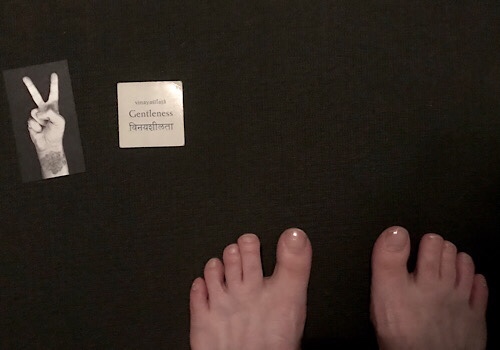I’m pretty sure that I am not alone in wishing that I would be assisted or touched–in yoga class or elsewhere–exactly when and how suits me without my having to say a word. But permeable/bridgeable boundaries require clear and steady awareness and communication.
I’m in the middle of a weekend workshop at Sun and Moon Yoga out in Fairfax (a whole different place from where I live and spend my time in the DMV, but that’s another story) with Dianne Bondy (check her out on social media or get her book) on making yoga more inclusive and accessible to all.
One of the many things discussed was consent. Since I wrote about my reaction to having to say yes or no to physical assists by hand raising, I’ve also been at a studio with cards that one takes and puts on one’s mat to say “no; please don’t touch me.” What if the card ends up under a prop? What if you don’t want other students to see that you don’t want (or want) assists? What if you change your mind?
The solution Dianne has seems the best I’ve seen. Every body gets a card (she uses playing cards from the dollar store). Face up means I am open to the possibility of an assist. Face down means leave me completely alone. Students can change which side is up throughout the practice.
If the card is face up, it’s just agreeing to further the conversation. Seeing that level of consent, Dianne said (as I was taught in my Anusara teacher trainings), if she thought there was something beneficial to offer, she then would ask while approaching if it was ok to offer an assist. If the answer was “yes,” then she would give a verbal assist. Only if the verbal assist was insufficient, would she ask if she could offer a physical assist and would say where she would touch the student to give the assist BEFORE doing so. The student would then have another opportunity to say “no” or provide limits on the permission.
Of course, in a big public class, this all gets done quite quickly, but I think this really is the only thing that works. I’m also sure, from my personal teaching experience, that there might be an occasional moment, like catching a student about to fall and maybe take down another student, that an urgent intervention must be done regardless of prior permission for assists generally–but those should be rare indeed.



